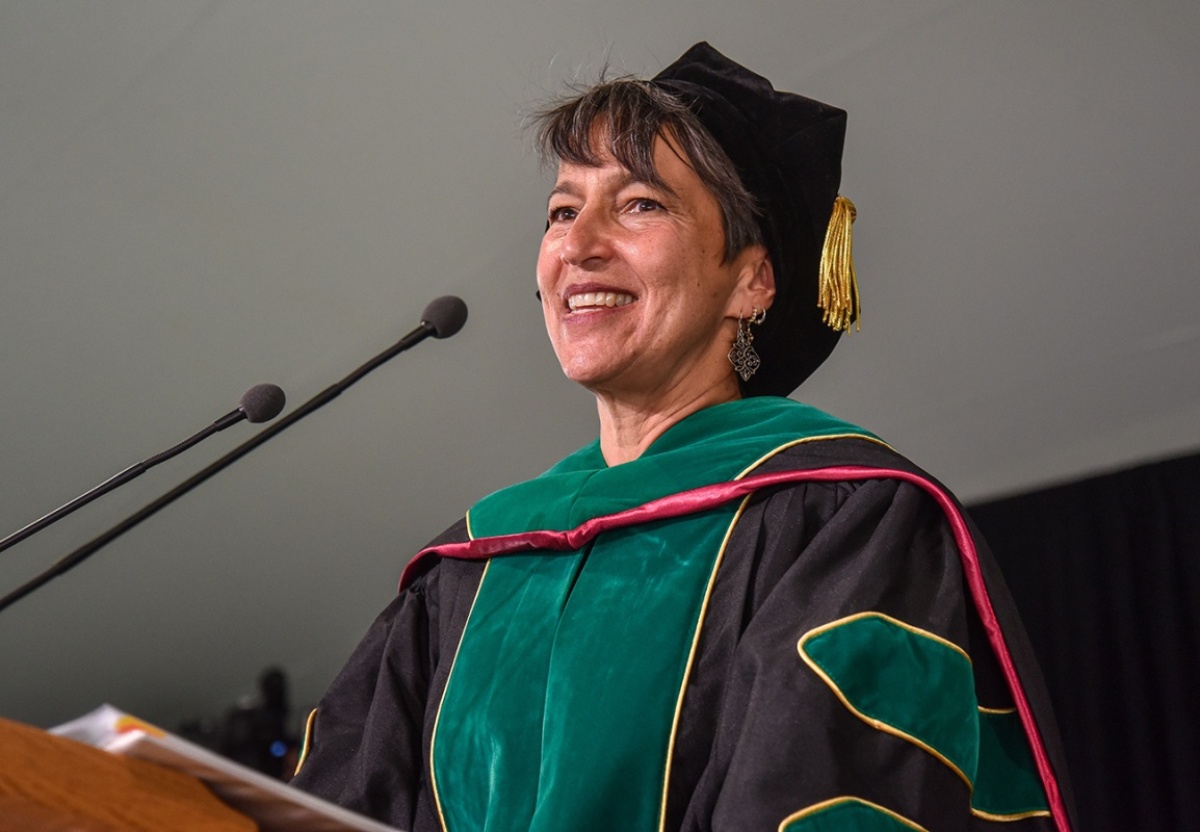Dr. Joia Mukherjee: Med Students Should Become Healers Choosing ‘Hope and Action’
PIH Chief Medical Officer provides words of wisdom at Harvard and University of Michigan Medical School graduations
Posted on Jun 27, 2022

In many ways, Dr. Joia Mukherjee, PIH's chief medical officer, embodies “radical hope,” a concept she spoke about recently at Harvard Medical School’s Class Day in May. An associate professor in the Department of Global Health and Social Medicine at Harvard Medical School, and in the Division of Global Health Equity in the Department of Medicine at Brigham and Women’s Hospital, Mukherjee also delivered the lead commencement address at the University of Michigan Medical School, where she urged graduates to keep their patients in close “proximity” in order to evolve from “doctors to healers.”
In other news, Mukherjee is also out with a second edition of her text book, “An Introduction to Global Health Delivery: Practice, Equity, Human Rights,” published by Oxford University Press. In the book, Mukherjee outlines the history of the global health movement; talks about the staff, stuff, space, systems and social support necessary to provide high-quality health care (PIH’s mantra of the 5Ss); and emphasizes the role that advocacy plays in building a larger community of globally minded citizens. The new edition is greatly expanded, she said, including “new content on pandemics, global leadership, and struggles against racism and colonialism.”
For further wisdom from Mukherjee, read excerpts from her graduation speeches at Harvard and the University of Michigan, respectively:
“The practice of medicine is rooted in HOPE,” Mukherjee said. “Hope that your action, our collective action, can lead to healing and change.” She stressed that the graduates are commencing medical practice “at a difficult time...one marked by despair and confusion” in which the failure of the market to deliver equitable health outcomes is painfully apparent.
“And, as usual,” she said, “those who have borne the brunt of this pandemic are the poor, the marginalized, the vulnerable—the sufferers of the pandemics—biological and social—that have long plagued humanity.”
Still, Mukherjee leaned toward optimism.
“I offer this,” she said. “Hope is as important now than it ever has been. Hope is an act of solidarity with those who are suffering. Hope leads us not to a desire for normal, but toward action to achieve a better future. It powers a willingness to wade into messy waters of sickness and suffering, to analyze the milieu of social injustice, and to address the root causes of disparate suffering. Hope with analysis and action is radical—it is a rejection of cynicism and pessimism.
It presents an alternative and brighter future.
Hope is an antidote to despair.”
And ultimately, Mukherjee said: “Hope and action, in solidarity with others, will help you cure a sick child, change a local system, and even move the levers of power. And while hope is never rewarded with complete fulfillment of a utopian ideal, it moves among us in innumerable acts of dignity and mercy, of healing and justice. It can trouble the waters of status quo. I have no doubt that you will save a life, contribute to a community, even change the world, but none of you will do it alone. The true art of medicine is rooted in the fundamental human action of caregiving, which is a team effort.”
At the University of Michigan Medical School, she told graduates in relation to the pandemic:
“The medical science we witnessed was breathtaking—the rapid understanding of the virus, the host response, the immunology, and the translation of that knowledge into vaccines and therapeutics. Bench to bedside at its finest. Yet, COVID-19 has provided for us all an object lesson in health inequity. Both in the U.S. and around the world, the risk of contracting COVID-19, the access to preventive vaccines and lifesaving therapeutics, and the health outcomes of those who fall sick with COVID-19 map the fault lines of our global society. Biomedical wonders alone have failed and will continue to fail to end the pandemic. Rather, social, political, and economic aspects of COVID-19—such as pre-existing poverty, high-risk living and working conditions, and the failure of the market to deliver equitable distribution—not the virus itself, drive the pandemic and all the related consequences the world faces.” Social medicine, she added, demands we address these forces and is rooted in proximity to suffering.
“For the rest of your life, you will take the knowledge and skills you have learned here and shape your practice. I have no doubt you will be brilliant doctors, capable of curing disease, discovering new therapies, setting broken bones,” Mukherjee said. “But whatever path you take in medicine, choose proximity … and develop your own opening for your journey with your patients. Proximity will help you think about the whole person before you, an analysis of their struggles will help you work with them and others to find potential remedies. In developing your unique art of medical practice, the canvas of your life—your talents, your passions, and your approach—will transform you from a doctor to a healer.”
Watch Mukherjee’s full speech at Harvard Medical School and the University of Michigan Medical School.